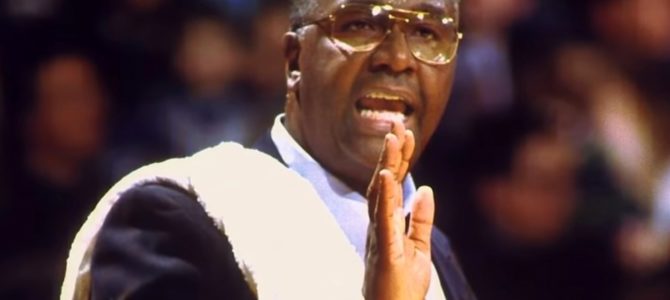
Down 63-62 with seven seconds to play in the 1982 NCAA Men’s College Basketball National Championship game, Georgetown University sophomore guard Fred Brown had the ball in his hand and the chance to set up the winning shot for his team. Freshman teammate Patrick Ewing stood near the basket, waiting for another chance to shine in a season that had given him so many chances and made him a household name.
For Georgetown Coach John Thompson, a win would have given him his first national championship, earned in a nip and tuck battle against another legendary coach: Dean Smith of North Carolina. But it was not to be.
Brown, momentarily confused in the big moment, passed the ball to the opposing team. James Worthy, one of many future Hall-of-Famers on the floor that night, gladly accepted the pass. In a flash, the game ended. Georgetown lost. Thompson’s championship slipped through his fingers.
Watching at home, way past my bedtime, I cried. I was all of 11 years old and I had made my first sports wager earlier that day. I bet a dollar on the Catholics to win. Catholicism was then and is now my faith, so to me then my bet reflected my trust in God to deliver us a victory. Thus, I cried in part because I thought God had let me down but, more importantly, I knew I didn’t have the dollar necessary to make good on the bet I would have to pay off the next morning at school.
Thompson didn’t cry. He threw his giant arms around Brown and hugged him. The image said it all: we are human. We all make mistakes. I still love you.
Thompson had lost so much more than I that night. But he didn’t break down. He wrapped Brown in a warm embrace. Coach Thompson, as large a man as you will likely ever see, gave Brown the biggest bear hug you could imagine. Yes, the young man who passed the ball to the opponent. For all that was known at the time, it was a mistake that cost Thompson what could have been his only chance at a national championship.
Yet, at that moment, Thompson focused not on the loss of the game but the lesson for life. It was a teaching moment I grasped via television at age 11, even though it was a lesson Thompson mainly intended for Brown. Thompson’s hug spoke of generosity, reflected wisdom, and demonstrated grace. All things Thompson possessed.
I may have cried at that time, but I knew intuitively I had witnessed something unusual. I had seen a man of uncommon humanity suffer a tremendous loss on the national stage yet walk away a winner — because he knew that relationships are much more important than a game’s outcome.
Those two men, along with Brown’s teammates, went on to win the championship two years later. I don’t remember much about that game. But that image of Thompson hugging Brown after the 1982 loss has stayed with me my entire life.
Over the years, I grew to admire the way Thompson spoke his mind and did not kowtow to what anyone expected of him. Consistent with that approach to life, Thompson gave troubled young men a chance where others wouldn’t. He recognized their intrinsic humanity.
Where many universities wouldn’t take a risk on a troubled high schooler because it could reflect poorly on the school if something went wrong, Thompson showed Georgetown it should take a risk because something could go right.
Time after time, that bet paid off. Those who have seen the remarkable video of Allen Iverson at his basketball Hall of Fame induction ceremony, breaking down in tears as he thanked Coach Thompson for saving his life, will never forget it. No one else would give Iverson a chance after Iverson broke the law in a bowling-alley brawl during high school. No one except John Thompson.
I admired all of those characteristics in Thompson. When I think of other famous figures I respected during my 1980s idyllic childhood, I think of people like Pope John Paul II, Mother Teresa, and Bill Kuntsler, the famous New York criminal defense attorney. These were leaders who, like Thompson, believed in people when no one else would.
It’s that spirit about Thompson that perhaps stands out most of all. He saw the flaws in his fellow man, and he loved him, anyway. In doing so, he inspired the rest of us to do the same.
Godspeed, Coach Thompson. I never played for you but I — like countless others — consider you one of the greatest human beings I’ll ever know.









